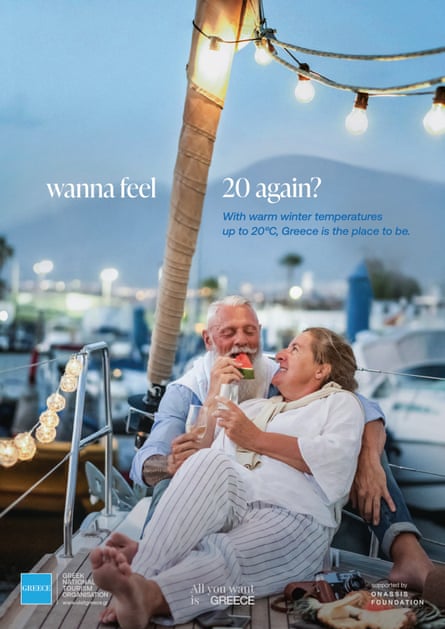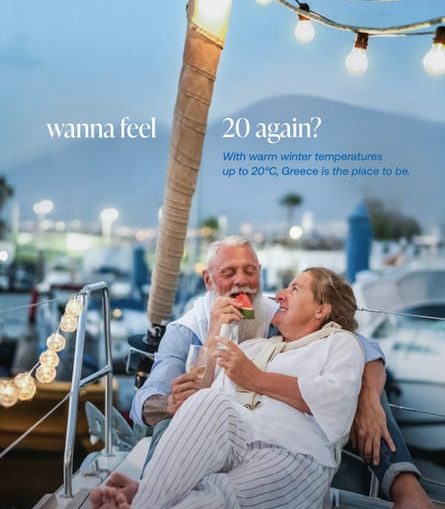It is mid-January, the new year has begun and Heraklion, the Cretan capital, is abuzz with tourists – most of them silver-haired. Over in Rhodes, senior citizens lap up the sun’s rays in the island’s elegant port town, many enjoying trips that began in November.
These scenes are not real – at least not yet. Vassilis Kikilias, Greece’s tourism minister, hopes they soon will be as he looks to make the most of an energy crisis, soaring bills and global uncertainty. “Our doors are open 12 months round, our friends in northern Europe should know this. They should head here for the winter.”
Next week, Athens will roll out a €20m (£17.5m) advertising campaign urging pensioners to do just that. “Wanna feel 20 again?” asks one of the billboards slated to appear in London and other capitals across the continent. “With warm winter temperatures up to 20C, Greece is the place to be,” it proclaims, next to an image of an older couple lounging on a yacht, wine glasses in hand.
Greece is not the only place with a warm greeting for citizens of colder climes. Tourism operators in Alicante in southern Spain and the Canary Islands are banking on “thermal tourism” to persuade northern Europeans faced with soaring bills to leave home and spend the winter in the sun.
“From what we’re seeing, people are realising that it’s cheaper to come here than to put the heating on at home,” said Miguel Ángel Sotillos, president of the Spanish federation of tourist apartments.
Kikilias has spent months working on Greece’s initiative. In September, he visited Paris, Berlin, Vienna and Stockholm to ram home the message, holding talks with pension fund managers, federations, tour operators and air carriers lined up to fly into Greek destinations throughout the winter.
“There’ll be clusters connected by direct flights with hotels and restaurants that are prepared to stay open,” he told the Observer. “What we’re saying is that it might be less costly to turn off the heat back home and come here. It’s as simple as that.”
 View image in fullscreenPart of the Greece ad campaign to lure northern European pensioners.
View image in fullscreenPart of the Greece ad campaign to lure northern European pensioners.
Greece has enjoyed an unexpectedly buoyant tourist season, with revenues and arrivals expected to exceed those of pre-pandemic 2019, a record year when the country attracted some 33.1 million people and more than €18bn in tourist earnings.
Visiting celebrities and Hollywood stars have not only given free publicity but helped boost ties with the US. The first direct American flight – one of an unprecedented nine daily – flew into Athens from New York on 8 March, kickstarting a market credited with promoting a sector that accounts for 25% of GDP and one in five jobs.
But the post-pandemic surge has not been without its critics. Accusations of over-tourism have been plentiful, not least on the more popular islands and in Athens, where visitor numbers topped 4 million in August alone.
Kikilias accepts that the quest to lure holidaymakers who might not normally visit in the hot summer months is also linked to a desire to see the tourist season prolonged. “The infrastructure on smaller islands was simply not built to accommodate so many people,” he concedes. “There was a time when Greece was only about sun, sand and sea, which is no longer true. There was a time when it would have been hard to imagine visitors here in the winter, but that is no longer the case either.”
This is the first time that Greece has concertedly tried to brand itself as a winter destination, with officials openly admitting that the strategy is to replicate the success of Spain, long a destination for retirees off-season. Images of the Greek sunset next to radiators that might otherwise heat homes are expected to loom large in an advertising campaign that will also be digital.
“People, especially pensioners, have always thought about the western Mediterranean in the winter months,” says Dimitris Maziotis, a PR strategist and senior aide to Kikilias who helped conceive the campaign. “What we’re saying is the eastern Mediterranean is here too.”
skip past newsletter promotion
Sign up to First Edition
Free daily newsletter
Our morning email breaks down the key stories of the day, telling you what’s happening and why it matters
Enter your email address Enter your email address Sign upPrivacy Notice: Newsletters may contain info about charities, online ads, and content funded by outside parties. For more information see our Privacy Policy. We use Google reCaptcha to protect our website and the Google Privacy Policy and Terms of Service apply.
after newsletter promotion
As part of the drive, airlines and tour operators will receive funds both to advertise Greece and keep routes going throughout the winter months. In a nation that has yet to appoint a tsar to advocate policies for the elderly – despite having one of the oldest demographics in the EU – or have retirement villages or housing that could cater for the third age, options are necessarily limited.
Cities with good hospitals and medical care will be among the destinations that are promoted. “Athens, Thessaloniki, Rhodes, Kos and Crete are on the list,” explains Maziotis. “They’re not only bigger, with hotels that will stay open, but in the case of Crete warmer too.”
The initiative, he adds, will also target digital nomads and couples with pre-school children.
The initial response to the prospect of winter in the sun as Europe heads into November has been promising. Cecilie Eslander, chief executive of Stockholm-based Grand Tours, which is owned by a 300,000-strong federation of senior citizens, says the reaction to the news has been overwhelmingly positive.
“It’s getting darker and colder here, and Greece is always popular,” she says, days after meeting Kikilias in the Swedish capital. “I think Norwegians and Swedes would love to visit but it’s always been Spain in winter, not Greece, and that’s partly because most of the hotels have been closed. Now that we know, we’ve planned a walking and exercise trip there with a Swedish celebrity TV trainer in late October. Everyone is excited.”
Additional reporting by Stephen Burgen in Barcelona




Leave a Reply
You must be logged in to post a comment.